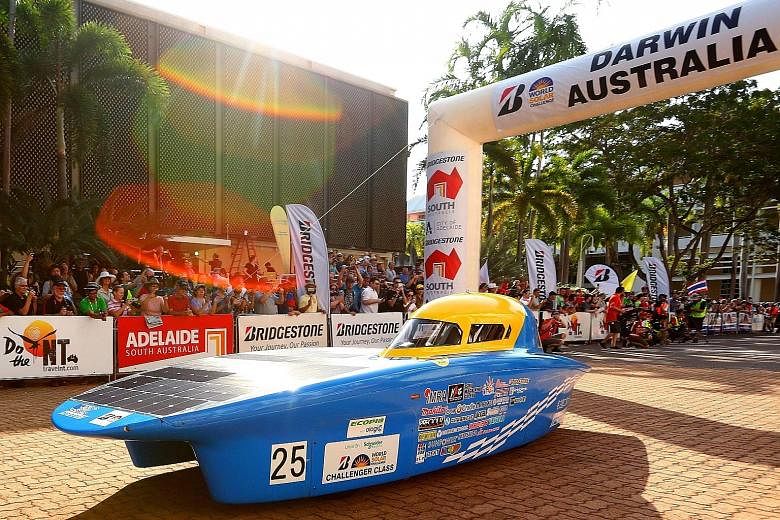SYDNEY • An epic 3,000km solar-car race across the desert heart of Australia - designed to showcase new technology that could one day help develop commercial vehicles - is under way.
The World Solar Challenge, first run in 1987 and last held in 2015, took off in a high-tech, futuristic flurry from Darwin's State Square yesterday.
Dutch team Nuon is aiming to defend its title but Belgium's Punch Powertrain led the 41 cars - powered by the sun and mostly developed by universities or corporations - off on the punishing journey south to Adelaide after a surprise win in Saturday's time trial.
"We knew our car was good but we never expected pole (position) because there are a lot of competitors over here, a lot of very fast-looking cars," team manager Joachim Verheyen told reporters.
The event has become one of the world's foremost innovation challenges, with teams looking to demonstrate designs that could one day lead to commercially available solar-powered vehicles for passengers.
Google co-founder Larry Page and Tesla co-founder J. B. Straubel are past competitors who credit the event in influencing their careers.
The main action will be the streamlined Challenger class - slick, single-seat aerodynamic vehicles built for sustained endurance and total energy efficiency.
Dutch team Nuon crossed the finish line first two years ago, taking 33.03 hours to make the punishing trip ahead of Japan's Tokai University, the 2011 winner, in a nail-biting climax.
Both teams are again in the hunt this year, with cars from the United States, Australia, Malaysia, India and South Africa among the competitors up against them.
There is also a Cruiser class, which aims to showcase solar technology for mainstream vehicles that are more practical for day-to-day use.
Entrants come from Hong Kong, Iran and Singapore, whose team from Singapore Polytechnic will race a two-wheel drive with a 1.5-kilowatt high-efficiency direct-current motor with a top speed of 100kmh. The team is called SunSPEC.
Event director Chris Selwood said: "Of course, the point of this challenge is not just to go fast, or to develop technology that will never reach the mainstream. Our founder, Mr Hans Tholstrup, and competitors past and present, are all determined to make sustainable, energy-positive, solar electric cars and renewable technology a reality."
Teams are allowed to store a small amount of energy but the majority of their power has to come from the sun and their vehicle's kinetic forces.
Crews are allowed to drive between 8am and 5pm each day and simply set up camp wherever their cars pull off the road at the end of the day. The first car to cross the line in Adelaide is the winner.
AGENCE FRANCE-PRESSE

